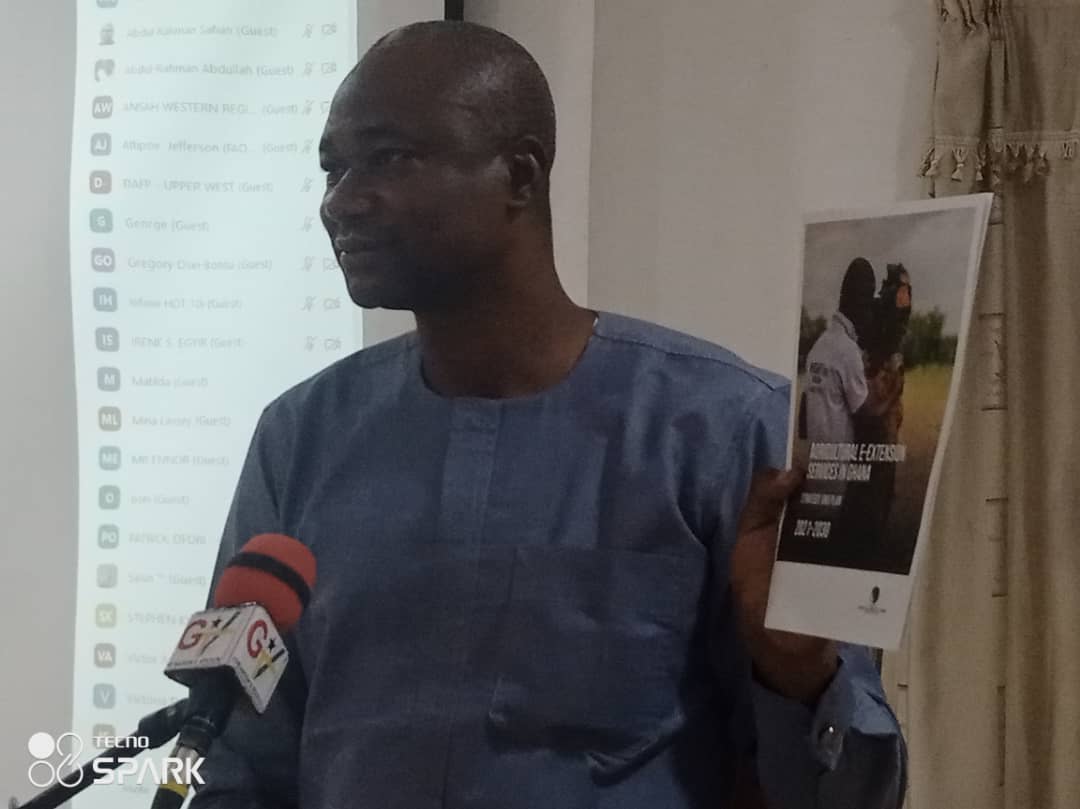
The Deputy Minister for Food and Agriculture, Alhaji Mohammed Hardi Tuferu, has stated emphatically that Agriculture helps to reduce poverty, raise incomes and improve food security for Eighty percent (80%) of the world’s poor, who live in rural areas and work mainly in farming.
According to him, electronic agriculture has evolved in many countries in Africa, that helps improve agriculture extension and agriculture advisory services. Adding that the reliance on ICT and digital tools has led to immeasurable opportunities for agriculture sector and its stakeholders.
The Deputy Agric Minister furthered that global experts in the agriculture sector have consistently reiterated the through extension services, and for the overall development of the national and rural economy.
Alhaji Mohammed Hardi Tuferu, made this known at the national launch of the E-Extension strategy and Plan for the ministry of Food and Agriculture , supported by Global Affairs Canada (GAC) under the Modernizing Agriculture in Ghana program to develop an E-Extension strategy and Plan was held at mensvic hotel in Accra.
The motive of this strategy and Plan is to provide all agricultural producers and value chain actors in Ghana with transformational ICT-driven extension services which are effective, efficient, inclusive, sustainable, demand-driven and pluralistic in a national coordinated , decentralized system with the active involvement of the private sector.
By 2030, 90% of small scale producers in Ghana will be served by and benefit from transformational E-Extension services, contributing to a 40% growth in farm profitability, a 60% growth in farm productivity, a 50% gain in the household income of farming families, a 70% increase in the use of e-Extension services by groups experiencing or more factors of marginalization such as women, youth, people with disabilities.
This to Deputy minister Alhaji Mohammed Hardi Tuferu, there is a strong justification for e-extension strategy and Plan given the current challenges in the sector. For instance, the extension officer to farmer ratio stands at 1:706 as compared to FAO standard of 1:500.
With the recruitment of 2,700 extension officers and the provision of motorbikes and vehicles under the Modernizing Agriculture in Ghana, (MAG) Programme, Extension Services
has become very attractive and empowered to deliver agricultural services to its clientele.
The Lawmaker for Nanton constituency, stated in categorically that the growing ICT space is having a positive in the agricultural sector, especially where the tool are problem-solving and result-oriented.
For him, ICTs have largely been used to connect even rural farming communities to relevant services ranging from weather alerts, agronomic practices, agribusinesses, and banking, among others, towards improving productivity, job creation, livelihoods, and decision-making at multiple levels in the sector, among others.
“The advent of the COVID-19 pandemic and its associated containment measures further demonstrate how increasingly extension and advisory services is important. This meant the need to re-orient extension and advisory services to take advantage of ICT complement the traditional methods of extension”.
On his part, Mr. Paschal Attengdem, Consultant Director of Agricultural Extension Services (DAES) explained that Ghana’s e-extension strategy and Plan is inspired by the vision of all Ghanaian agricultural producers and value chain actors being reliably and sustainably by transformational , remote-let technology-enabled e-extension services by 2030.
He revealed that the delivery of transformational E-Extension services address the specific, often distinct needs of women, men and Youth agricultural producers ( farmers, livestock keepers, fishers) and other agricultural value chain actors of all abilities to improve the quality of rural life by raising agricultural productivity and profitability, enhancing nutrition, increasing resilience, and reducing poverty.
Adding that E-Extension services will support farmers and other agricultural value chain actors in applying environmentally sustainable Agriculture and resource- management practices at optimal scale. Strengthen market linkages and access to inputs and many more.
Report By Bernard K DADZIE

